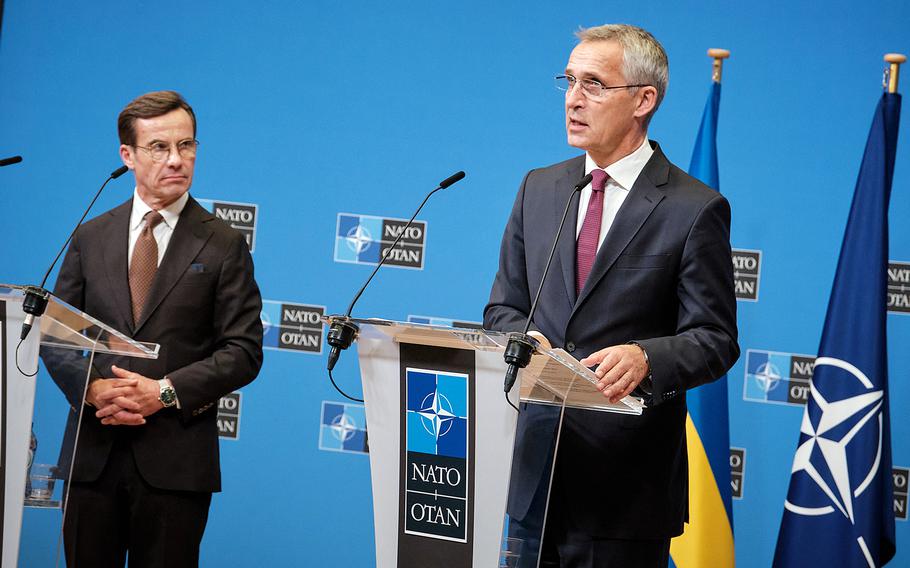
Swedish Prime Minister Ulf Kristersson, left, listens as NATO Secretary-General Jens Stoltenberg speaks at a news conference at NATO headquarters in Brussels on Oct. 20, 2022. (F. Garrido-Ramirez/NATO)
It’s unfathomable that NATO would fail to respond to threats against aspirants Sweden and Finland as they await final membership approval from holdouts Turkey and Hungary, the top alliance official said Thursday.
Secretary-General Jens Stoltenberg said at a news conference at NATO headquarters in Brussels that NATO is already treating the two Nordic countries as something akin to full-fledged members.
The United States and 27 others among NATO’s 30 members have already green-lighted the entry of Sweden and Finland into the transatlantic security pact, which comes with collective defense assurance that an attack on one member demands a response from all.
But uncertainty remains over whether Turkey and Hungary, two countries with reputations for going against the alliance grain, are on board.
Although there is no set timeline for the accession of Finland and Sweden, NATO is feeling a sense of urgency to get the deal done.
“As invitees, you are now integrating into NATO’s political and military structures,” Stoltenberg said alongside Sweden’s new prime minister, Ulf Kristersson. “And it is inconceivable that allies would not act should Sweden and Finland come under any form of pressure.”
Many alliance member countries, including the U.S., have already given Finland and Sweden security assurances, and NATO has upped its presence in the Baltic region as a security precaution.
Nevertheless, questions loom about what Turkey’s and Hungary’s next move will be.
Kristersson said he is prepared to visit Ankara to move talks with Turkey forward. Turkish President Recep Tayyip Erdogan has complained that Sweden and Finland have not been fully supportive of Turkey’s concerns over terrorism on NATO’s southern flank.
During NATO’s June summit in Madrid, Sweden, Turkey and Finland entered into a trilateral memorandum designed to address Ankara’s concerns about Kurdish militant groups.
Kristersson spoke of his country’s commitment to the agreement, adding that fighting terrorism is of “fundamental importance.”
Meanwhile, Hungary has been less explicit over what concerns, if any, it has about the membership bids of Finland and Sweden.
But Hungarian Prime Minister Viktor Orban, known for his friendly ties with Russian President Vladimir Putin, remains a wild card.
Still, Sweden and Finland are on track for eventual membership, said Stoltenberg, who noted that the accession process for both “has been the fastest in NATO’s modern history.”
Both countries are wealthy and boast advanced militaries and stable governments. In addition, they have been close partners with NATO states for years.
Formal induction would give the allies a more comprehensive security buffer, Stoltenberg said.
“Your membership will strengthen the alliance’s presence in the High North and deepen Nordic and Baltic defense cooperation,” Stoltenberg told Kristersson.